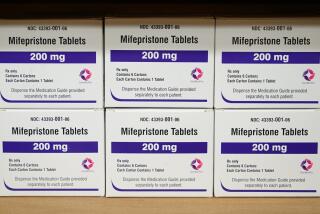Unusual Legal Rules to Be Factor in Trial on Miscarriage Drug
- Share via
Mildred Serdahely can’t recall the brand name of the drug she took during her pregnancy in 1959. She can’t remember its appearance, the dosage, the container or the label.
The Costa Mesa pharmacy where she bought the drug to counter the possibility of miscarriage cannot find records of the prescription. Her then-physician cannot locate her medical records.
What is certain is that her daughter Nanette developed cancer of the cervix, plus other cervical and vaginal abnormalities, at age 18.
Nanette’s physician is convinced that the cause was DES, the chemical diethylstilbestrol, which was widely prescribed for pregnant women until it was banned in 1971.
Trial Set for Wednesday
The Serdahelys of Orange County are set to begin trial Wednesday in Orange County Superior Court on their claim against four firms that manufactured the drug. The pharmaceutical companies claim there is no evidence that Serdahely took a drug they manufactured, or that she took DES at all. They also assert that she failed to file her lawsuit quickly enough.
Several factors make the case unusual:
- Lawyers acknowledge that they cannot prove which, if any, of the defendants manufactured the pills that Mildred Serdahely took.
- Before they can collect any damages, the Serdahelys must win three separate trials before three different juries.
- In most states a claim like Mildred and Nanette Serdahely’s would never have reached a courtroom, whether warranted or not.
“Most states have not been as progressive as California as far as these cases are concerned,” said Leland Van Koten, a Washington attorney who last year won the first jury verdict ever returned in favor of a man who claimed to have been injured before birth by DES.
“Some cases can be absolutely impossible,” Van Koten said. “You can have an independent drug store that has changed hands 10 times. The pharmacists and the doctors are dead. There are no records. You’re in deep trouble.”
In 1980, the California Supreme Court swept aside traditional rules and decided that cancer victims may sue DES manufacturers even though they cannot identify the particular brand the victims claim caused their illness.
In a dramatic expansion of liability for businesses, the court ruled that all manufacturers which shared in the market for DES who could not prove their product was not involved were held responsible for the injuries.
Made by 200 Companies
The drug, a synthetic hormone widely used to prevent miscarriages, was manufactured by about 200 companies from 1941 until 1971, when its use during pregnancy was banned by the federal Food and Drug Administration. It is still considered one of the most effective treatments for prostate problems.
Studies have linked DES to cancerous vaginal and cervical growths in the daughters of women who took it, and more recently, incomplete sexual development in sons.
According to one estimate, up to 3 million women took DES. The incidence of vaginal cancer among DES daughters has been estimated at less than 1%. Between 700 and 1,000 DES cases are now pending nationwide.
Generally, the law requires victims in cases of defective products to specify the manufacturer. But Nanette’s cancer was not diagnosed until 19 years after her mother’s pregnancy, and more than a year passed before the lawsuit was filed.
“The inability of (Mildred Serdahely) to identify the precise manufacturer of the drug her mother took while pregnant with her is a circumstance which has arisen through no fault of her own,” according to papers filed in the case.
“Because of the long latency period for the development of cancer . . . records have long since been destroyed,” according to the suit.
Serdahely, who had miscarried several times before, was pregnant with Nanette when she noticed spotting and consulted her doctor. He prescribed medication.
“First he gave me the correct name which I couldn’t understand,” Mildred Serdahely said in a deposition. “Then he put his arm around me and hugged me and said all I needed to know or to remember was DES.”
In June, 1979, Nanette Serdahely’s doctor “told her she had clear cell adenocarcinoma of cervix and vagina. He said it was very rare in young women,” said Joseph A. Shaub, her attorney. “The doctor told her she had probably been exposed to DES.”
She then had a “complete hysterectomy and other serious surgery. She had radiation treatment,” Shaub said.
Talked to Doctor’s Wife
Six months later, Mildred Serdahely went to the home of the doctor who treated her during her pregnancy. She told the physician’s wife about her daughter, and explained the urgent need to find her medical records. She never heard from the doctor, Shaub said.
Wednesday’s trial is scheduled to begin before Orange County Superior Judge Leonard Goldstein. Shaub and his associate, Roman Silberfeld, will have to counter claims by Eli Lilly & Co., Upjohn Co., Squibb Corp., and Boyle & Co. that Serdahely could not have purchased their product at the Costa Mesa pharmacy.
Although lawyers for the drug firms declined comment, court papers show that they contend that state law bars the claim because it was not filed within one year of the diagnosis of Nanette’s cancer.
Shaub said Nanette was “trying to get her life together” at the time and did not realize that DES might have been the cause until a relative mailed her a newspaper story about a DES daughter who had filed a lawsuit in Boston.
“The last thing she was thinking about then was suing somebody,” Shaub said.
“I believe that DES causes this cancer,” Shaub said. “I don’t think there is any doubt that it does. The only people nowadays who seriously contest that are drug companies, their lawyers and the experts they hire to testify in court.”
Nationwide, the trend is for pharmaceutical companies to settle cases in which victims can identify the brand of drug they took, said Barbara Taylor, who edits a DES litigation newsletter published in Edgemont, Pa.
Awards Kept Confidential
The size of the settlements, Taylor said, are kept “very confidential.”
“Just recently, a settlement amount was announced for the first and only time that I can remember,” Taylor said. “It was a case in Wisconsin. The woman settled for $348,200.”
In that case, the woman found records documenting her specific drug purchases from an identifiable firm, according to her Milwaukee lawyer, Susan Rosenberg.
“Once the drug companies are convinced there is product identification, they do settle,” said Van Koten, who won the DES case in Washington.
“‘Otherwise, they fight these cases very, very hard,” Van Koten said. “They spare no expense. We won a $400,000 verdict and between our fees and expenses, the award didn’t compensate us fully, had we been billing at regular hourly rates.”
The first Serdahely trial is expected to last three weeks, and it will determine whether the others need to take place. A second trial before a different jury would be needed to determine how much of the market the four drug companies had in 1959, which would establish their portion of liability.
Finally, the third trial, if necessary, would deal with the more routine issues of personal injury cases, such as the dangerousness of the drug and the amount of damages.
More to Read
Sign up for Essential California
The most important California stories and recommendations in your inbox every morning.
You may occasionally receive promotional content from the Los Angeles Times.













